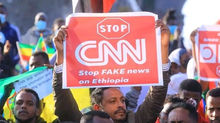- Nicoletta Fagiolo
THINGS STILL FALL APART: THE POLITICS OF MEMORY IN CÔTE D’IVOIRE

“The Igbo people say, If you want to see it well, you must not stand in one place. The masquerade is moving through this big arena. Dancing. If you’re rooted to a spot, you miss a lot of the grace. So you keep moving, and this is the way I think the world’s stories should be told; from many different perspectives.” Chinua Achebe
“The History of my country is too recent Madame President, and those who try to falsify it by twisting its neck are engaged in an exercise which is unlikely to succeed. Madame President, as I do not want to be the shame of my generation and I refuse to be thrown into the dustbin of History, I would like to bring some freshness to the collective memory that those I call fact smugglers are trying to erase.”
With these words in October 2014, Ivorian youth leader Charles Blé Goudé, known since 2002 as ‘the street General’, for his ability to mobilize large numbers of people onto the streets for huge non-violent protest marches, addressed the International Criminal Court’s (ICC) pre-trial hearing. Charles Blé Goudé is facing a joint trial for crimes against humanity at the ICC with former Ivorian President Laurent Gbagbo. Yet, for many Ivorians, Blé Goudé is their hero for being a non-violent youth leader who managed in all crucial moments of the country’s recent history to block an illegitimate takeover of the government by a foreign backed rebellion, the Forces Nouvelles (New Forces).
For a large part of the Ivorian population, Laurent Gbagbo, ‘deported’ to the Hague, embodies the country’s democratic nationalist interests in a post-colonial state which had to face neo-colonial practices of western imperialism, including the use of political memory as propaganda. So as to legitimize its coercive ways, western mainstream media, NGOs and major think tanks, as well as many academic and “expert” historical publications, conveniently omit the 2002 rebel incursion and falsely depict the Ivorian crisis as an ethnic civil war or a war between a Muslim north against a Christian south. Why? And for whom? For a western audience whose consensus on the use of force is needed to accomplish coercive foreign policy actions?






